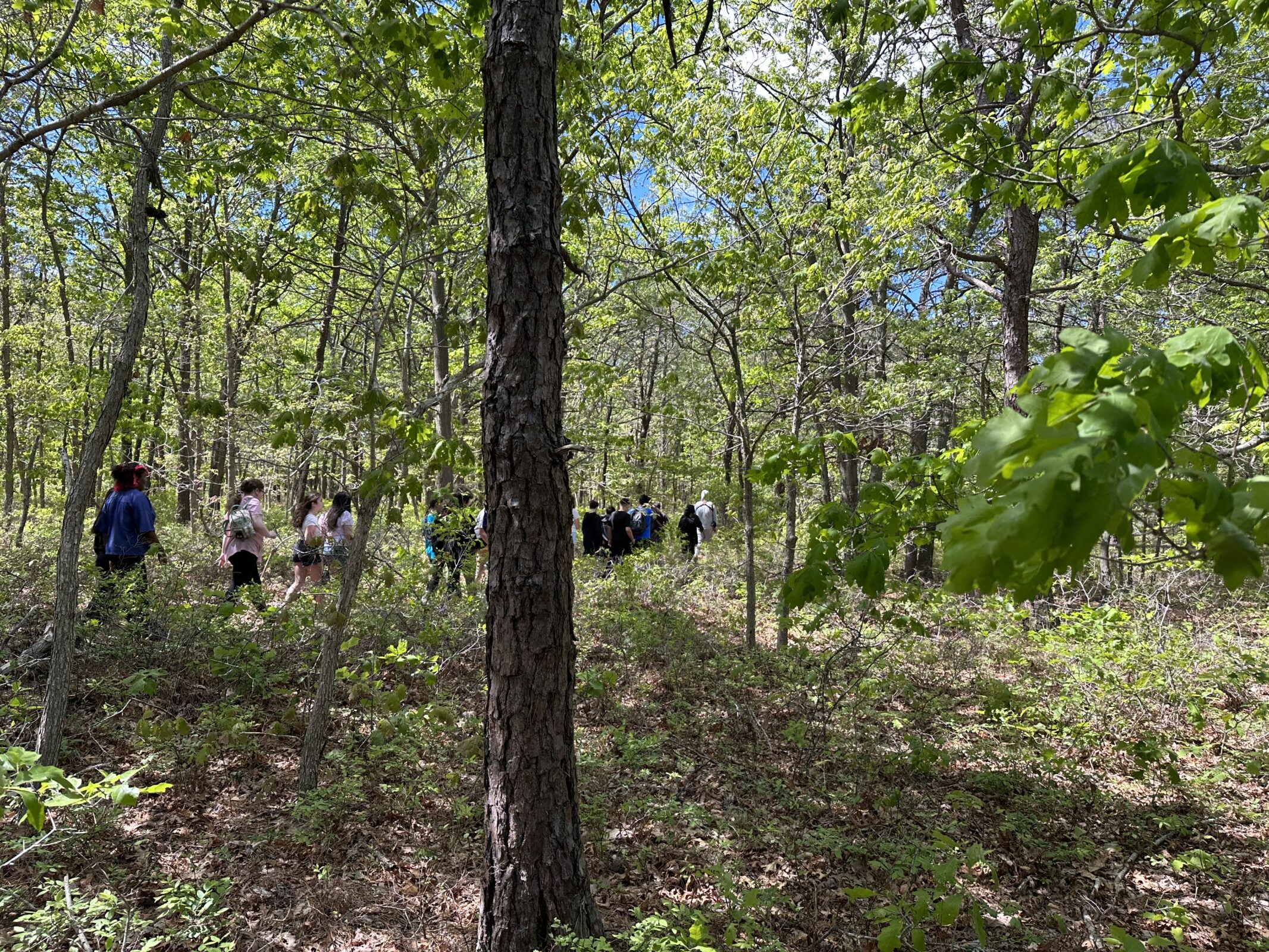This June marks the end of the 14th “Middle School Kids Go To College” program. We at the Long Island Pine Barrens Society are very proud of the fact that we’ve been able to provide Long Island middle schoolers with the opportunity to be scientists for so many years, and are immensely thankful to the National Grid Foundation for their continued support in this endeavor. “Middle School Kids Go To College” challenges sixth grade students to consider real, ongoing problems related to Long Island’s aquifer system in solution-oriented ways. They are tasked with independently studying (either as an individual or part of a team) a problem of their choosing, and present solutions to said problem. It’s one of the most rewarding things the Pine Barrens Society does, as it is only through inspiring the next generation that we can ensure that Long Island continues to be preserved and protected for years to come.
“Middle School Kids Go To College” starts in the classroom. This year, 70 sixth grade students from the Patchogue-Medford School District were taught all about Long Island’s aquifer, including the many threats to it, and the ways in which we can preserve it. These students also were taught about responsible waste management, and the nearby threat of the Brookhaven Landfill, as part of a new program. “Inspiring Youth to Protect Their Environment” is a pilot program, created thanks to the support of the Long Island Unitarian Universalist Fund, which is directly modeled after “Middle School Kids Go To College.” This new program zeroes focuses on the area around the Brookhaven Landfill, the impending closure of which represents a serious environmental challenge to Long Island in general, and the locations around the Patchogue-Medford School District in particular. This double focus this year resulted in a wide variety of student projects, as students incorporated themes and ideas from both programs, leading to a fuller understanding of Long Island’s ecological challenges. From tried-and-true topics such as the impact of PFAS chemicals, to novel ideas like the lingering effects of PPE waste from the COVID pandemic, the dozens of projects covered a dizzying array of topics.
Students first presented their projects at “Water Day,” which occurred at each of the three Pat-Med middle schools in April and May. In addition to members of the Pine Barrens Society, students also presented to their friends, parents and classmates, giving them a taste of what it’s like to be a scientist showcasing their findings. In addition to the diversity of topics, many students also used various props and visuals to demonstrate their work, making for many engaging, novel presentations.

Much like last year, this year’s program also included a hike to Fish Thicket Preserve. In addition to members of the Society, who led the hike, the students were joined by representatives from the Brookhaven Landfill Action and Remediation Group, the Society’s collaborator in developing the “Inspiring Youth” program. Thus, the hike focused not just on the ecology of Fish Thicket – including the damage dealt to it by the Southern Pine Beetle, the presence of migratory birds, and its connection to the aquifer – but also on the negative impacts of dumping, and the danger posed by the proximity to the landfill. Lots of garbage was picked up over the course of the hour-long hike, meaning the students not only had a good time outdoors, but also left the place better than they found it. If only one concept can sum up these programs – and the work of the Pine Barrens Society in general – it’s that.
On Tuesday, May 27th, the “Middle School Kids Go To College” program fulfilled the promise of its name by bringing all the students up to Stony Brook University. There, they were treated to a lecture on Long Island water quality, and the struggles to improve it, by distinguished professor Dr. Christopher Gobler. One of the leading experts on the topic, Dr. Gobler was able to present the kids all of the information at a level they could understand, without ever dumbing things down. The kids asked a litany of questions, and came away from the lecture with a much better understanding of where the work they’ve done for the past few months fits into the wider context of the issue. After Dr. Gobler’s talk, the students presented their projects to attending members of the Center for Clean Water Technology.

As it did last year, the “Middle School Kids Go To College” program concluded with an awards celebration held at Wertheim National Wildlife Refuge. Nine of the projects (three from each school) were selected as the winners of the program, and these students were presented with award plaques provided by the National Grid Foundation. Local officials such as Deputy County Executive Jennifer Juengst and Pine Barrens Commission Executive Director Judy Jakobsen spoke at the event, commending the students for their hard work and recognizing them as the future problem-solvers the county – and the country, and the world – will desperately need going forward. Also in attendance were representatives from the National Grid Foundation and the Brookhaven Landfill Action and Remediation Group, who similarly honored the students. Once more, the students presented their projects to these guests, as well as their friends and family, marking the true end of the two programs, as the students were able to showcase their knowledge one more time.

The ”Middle School Kids Go To College” program has been a staple of the Pine Barrens Society’s work for more than a decade. With each passing year, we work hard to improve the program, and now that we’re developing the “Inspiring Youth to Protect Their Environment” program using the same model, the scope of what we do is widening. With these programs, we encourage kids to think of themselves as problem-solvers, force them to study the issues independently, determine the best ways to present their findings and advocate for their solutions. In other words, we teach them to be scientists. In having them showcase their work to their community, we also teach them to be advocates. By inhabiting these two roles, students will grow up with a keener understanding of the problems facing Long Island, and what they can do to solve them. It is thanks to this that the Pine Barrens Society’s work with students will stand beside the Pine Barrens Protection Act as a core part of its enduring legacy. By preparing the youth today, we’re ensuring the health and prosperity of Long Island tomorrow.
By Travis Cutter, Long Island Pine Barrens Society


